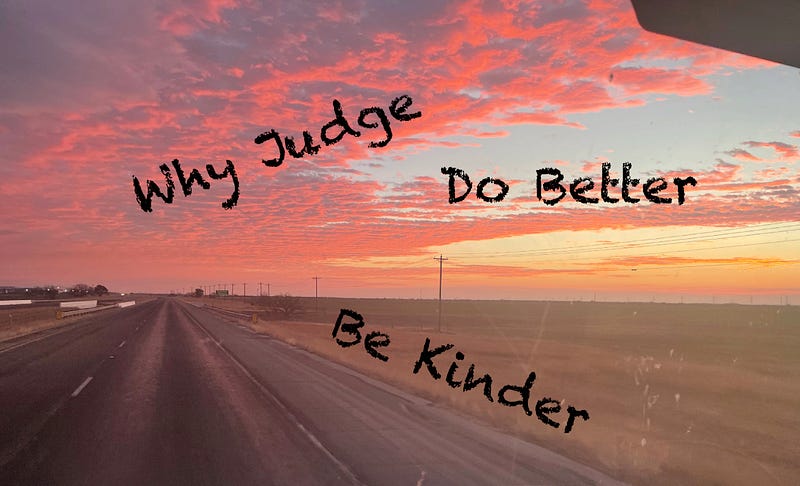Understanding Society's Judgmental Nature: A Call for Kindness
Written on
Chapter 1: The Roots of Judgment
Every morning, as I sit down at my computer, I find myself pondering the events of the world. I browse news articles and websites until one particular headline captures my attention.

A recent article titled, “Canadian politician criticized for photo of wife shoveling snow after a long shift,” sparked my curiosity. Reading the comments that followed the post highlighted a troubling aspect of our society: the tendency to be excessively judgmental about others' lives. Many responses questioned why the politician wasn't helping his wife instead and mocked him for suggesting he would prepare her breakfast. It’s disheartening how quickly people form negative opinions about someone they don’t even know.
His wife later clarified that she chose to shovel the snow herself, possibly as a means to release some stress after a tough night at work or to fit in some exercise before heading back to her next shift. Over the past three decades, particularly with the rise of social media, I've observed that individuals have become increasingly vocal about their opinions. While everyone is entitled to their perspective, the issue arises when people believe that their views are the only valid ones, often leading to belittlement of those who think differently.
My generation often labels these individuals as “keyboard warriors.” Many would likely refrain from expressing such harsh judgments if they were face-to-face with the person they criticize. While everyone has the right to their opinion, the challenge lies in how we express those opinions. Disagreement is a natural part of life, and it’s essential to recognize that differing views don’t erase the many commonalities that may exist between individuals.
Younger generations seem to have internalized the idea that uniformity in thought is essential, and those who disagree are seen as adversaries. This mindset is fundamentally flawed. Just because two people have different opinions doesn’t mean they lack shared experiences or values. Personally, I wouldn’t want my wife shoveling snow, but if she chooses to do so, I would respect her decision. She has her own ways of coping with life's challenges.
We all navigate life differently, and understanding this diversity is crucial for societal harmony. Insulting or demeaning someone for their choices is unacceptable. The uproar over this particular politician's situation likely gained traction due to his public status; had it involved an average citizen, the reaction may have been far less severe.
Social media has created a false sense of security, allowing individuals to voice their opinions without considering the impact of their words. Often, when faced with backlash, people invoke their right to free speech, particularly in the U.S. While the First Amendment protects this right, it does not grant permission to be disrespectful. This is where younger generations seem to misunderstand the essence of free speech.
My generation grew up understanding that while we have the right to express ourselves, we must also recognize the consequences of our words. Just because one can do something, does not mean it is the right thing to do. For instance, I can commit a crime, but that doesn’t justify the action.
In conclusion, it’s vital to reflect on our words before sharing them. If you’re unaware of the struggles others may be facing, it’s best to refrain from judgment. Our interpretations of right and wrong are subjective and may not apply universally. Let’s strive to be better, kinder, and more understanding. After all, we never truly know what battles others are fighting.
If you found this post insightful and wish to read more, consider subscribing to my email list here on Medium. Additionally, I encourage you to explore other writers' contributions on Medium. If you prefer not to join Medium, you can join my personal email list to receive updates on new content from my website.
Chapter 2: The Impact of Opinions in the Digital Age
In this video, "Why Do We Judge Others? Unpacking the Psychology Behind Everyday Judgments," we delve into the psychological underpinnings of our judgments and how societal norms influence our perceptions.
The video "How to Be Less Judgmental" offers practical advice on fostering empathy and understanding, encouraging viewers to reconsider their judgmental tendencies.